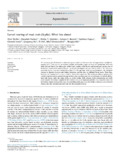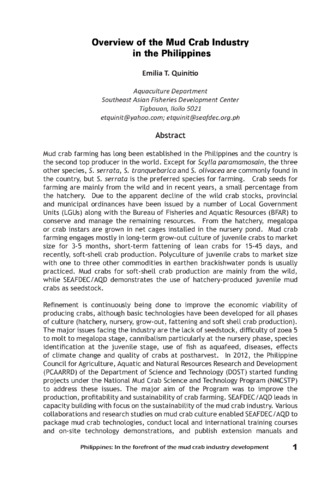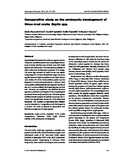| dc.contributor.author | Laranja, Joseph Leopoldo Q., Jr. | |
| dc.contributor.author | Quinitio, Emilia T. | |
| dc.contributor.author | Catacutan, Mae R. | |
| dc.contributor.author | Coloso, Relicardo M. | |
| dc.date.accessioned | 2014-05-28T09:22:14Z | |
| dc.date.available | 2014-05-28T09:22:14Z | |
| dc.date.issued | 2010 | |
| dc.identifier.citation | Laranja Jr., J. L. Q., Quinitio, E. T., Catacutan, M. R., & Coloso, R. M. (2010). Effects of dietary l-tryptophan on the agonistic behavior, growth and survival of juvenile mud crab Scylla serrata. Aquaculture, 310(1-2), 84-90. | en |
| dc.identifier.issn | 0044-8486 | |
| dc.identifier.uri | http://hdl.handle.net/10862/2103 | |
| dc.description.abstract | The reduction of the survival of mud crab during culture has been largely attributed to aggressive encounters and cannibalism. In some crustaceans, suppressed aggression is linked to increased concentration of circulating and brain serotonin (5-hydroxytryptamine, 5-HT). Likewise, tryptophan (TRP), a precursor of 5-HT is reported to suppress the aggression and improve the survival of some cultured fish through dietary supplementation. We investigated the effects of feeding formulated diet with different TRP levels (0.32% as control, 0.5%, 0.75% and 1% of dry diet) on the agonistic behavior, growth and survival of juvenile mud crab Scylla serrata. Mud crabs were individually stocked and fed the experimental diets for 4 weeks before they were set to a one hour fight experiment. The fights were recorded using a video camera and the aggressiveness of the crabs was quantified. Hemolymph was sampled after 15 and 30 days of feeding (resting) and right after the fight to measure circulating 5-HT concentration. Higher TRP levels suppressed the aggressiveness of mud crab in a dose dependent manner. The intensity and frequency of attacks were both significantly lower (P < 0.05) in those given diets containing 0.75% and 1% TRP as compared with the control. Serotonin-ELISA assay revealed that 5-HT levels in the hemolymph before the fight (after 15 and 30 days; resting) were not significantly different between treatments. However after the fight, 5-HT concentration was significantly higher in TRP-supplemented mud crabs as compared with the control (0.5% = P < 0.05; 0.75% and 1% = P < 0.01). Furthermore, mud crabs (0.16 g BW) were reared in 0.40 m2 circular tanks at 20 crabs/tank and fed the experimental diets for 30 days to determine growth and survival. Survival was higher in TRP-supplemented mud crabs (0.5% = 35%, 0.75% = 33.33%, 1% = 35%) as compared with the control (18.33%). However, daily growth gain (DRG), relative growth rate (RGR) and specific growth rate (SGR) were reduced in TRP-supplemented groups than with the control group. In conclusion, the data shows that the aggressive behavior of juvenile mud crab can be suppressed by supplementation of L-TRP. The survival of juvenile mud crab can be improved by increasing the level of TRP to 0.5%–1%. However, higher TRP levels may affect growth of mud crab. TRP supplementation resulted to a significant increase of 5-HT concentration in the hemolymph which was clearly observed after the fight suggesting that 5-HT plays an important role in suppressing the agonistic behavior of mud crab during aggressive encounters. | en |
| dc.language.iso | en | en |
| dc.publisher | Elsevier | en |
| dc.subject | Decapoda | en |
| dc.subject | Scylla serrata | en |
| dc.title | Effects of dietary l-tryptophan on the agonistic behavior, growth and survival of juvenile mud crab Scylla serrata | en |
| dc.type | Article | en |
| dc.citation.volume | 310 | |
| dc.citation.issue | 1-2 | |
| dc.citation.spage | 84 | |
| dc.citation.epage | 90 | |
| dc.citation.journalTitle | Aquaculture | en |
| dc.subject.asfa | aggressive behaviour | en |
| dc.subject.asfa | bottom culture | en |
| dc.subject.asfa | brain | en |
| dc.subject.asfa | diet | en |
| dc.subject.asfa | feed composition | en |
| dc.subject.asfa | feeding experiments | en |
| dc.subject.asfa | fish culture | en |
| dc.subject.asfa | growth rate | en |
| dc.subject.asfa | survival | en |
| dc.identifier.doi | 10.1016/j.aquaculture.2010.09.038 | |
| dc.subject.scientificName | Scylla serrata | en |



